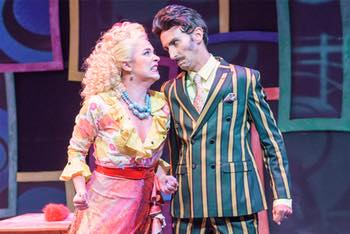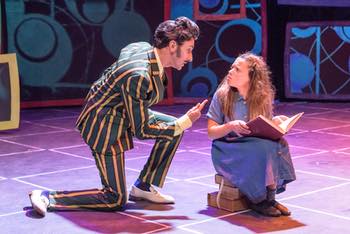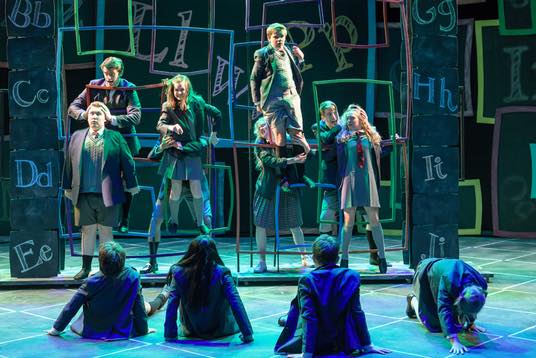Through Sun 8/11
What do James and the Giant Peach, Charlie and the Chocolate Factory and George’s Marvelous Medicine all have in common? They were all written by Roald Dahl. The British author’s short stories, many of which were written for children, are known for their unexpected endings, dark comic mood, and villainous adult enemies of the child characters.
His 1988 Matilda has been adapted by Dennis Kelly as a stage musical. It has music and lyrics by Tim Minchin. It opened on the West End in London in 2011, winning the prestigious Olivier Award for best new musical in 2012. The show won the 2013 award for best musical on Broadway, where the show ran for 1,555 performances. It’s now onstage at the Beck Center.
Matilda The Musical is the story of a five-year-old girl with extraordinary powers. She is the daughter of a self-centered father who calls her “boy” because he didn’t want a girl, and a ditzy mother whose life centers on dance contests and an infatuation with her Latino dance partner. Matilda finds refuge in books. She reads the books and acts them out for the school’s librarian.
School is a nightmare for the child. Between the students who resent her superior intellectual abilities and Miss Trunchbull, the hunchback sex-neutral head mistress who believes “Children are maggots,” her only refuge is her kind and caring teacher, Miss Honey, and the school librarian.
We watch with pleasure as Matilda stands up against the adults in her world, and in doing so, discovers her own remarkable powers. Matilda’s bravery teaches Miss Honey and her classmates an important lesson — that even though life can be hard, “Nobody but me is going to change my story” so “Sometimes you have to be a little bit naughty.”
The musical script is a compilation of various Matilda stories, which I found out from the adorable pre-tween brother and sister sitting behind me opening night. They knew all the stories and delighted each other by whispering, “Do you know what is going to happen next?” And then, of course, relating the happenings. Ah, the joys of children and children-oriented theater.

Having seen both the London and Broadway productions, and not being particularly enamored by either, I must admit I was pleasantly surprised by the Beck Center production. I enjoyed the nicely paced second act, the marvelous kids, and Martin Céspedes’ choreography.
Nine-year-old Sophia Tsenekos was delightful as Matilda. (She trades off the role with Ella Stec, who I did not see portray the role.) Sophia lights up the stage whenever she appears. This is a triple-threat little thespian who can sing, dance and act at high levels. Watch for her name to appear in local, and possibly national playbills. Yes, she is that good.
Finn O’Hara captivates as the awkward Bruce. His “eat the whole cake” scene was a total delight as were his physical education class hijinks. Samantha Lucas has a fine singing voice and was totally realistic as Miss Honey. Her “My House” was lovely. Neda Spears shines as Mrs. Phelps, the librarian. Her interplay with Matilda was endearing. Grace Mackin delights as Lavendar, Matilda’s friend.
Portraying Miss Trunchbull, Trey Gilpin made the wise decision to tone down the overacting which was present in both the London and Broadway productions. The character is evil enough as is and overdoing the role makes him ridiculous rather than pathetic.
Timothy Allen’s Mr. Wormwood displayed the typical Brit bar-pub exaggeration. His between-acts routine, however, needed better farcical timing. Maybe even elimination as Americans don’t often understand or go in for that kind of “entertainment.”
Olivia Billings and Joey Carmello were a bit over-the-top, as the mother and Rudolpho, though their dancing, especially Carmello’s hip movements, were well-conceived.
The kids (both the young ones and the more mature variety) were universally outstanding. They acted and sang with high-quality results. Their stage movement/dancing was very impressive.
Choreographer Martin Céspedes proved once again that he has a knack for being able to get anyone to look like talented dancers. He appears to be a master in difficult task of working with children. I thought this show’s choreography was, in some ways, more impressive and creative than the professional productions I saw.
Unfortunately, the decision was made for the cast to use British accents. It’s hard enough for American ears to understand Brits who speak the language naturally. But with Beck’s terrible sound system, which makes echoes out of spoken and sung words, adding the accents made understanding the words almost impossible. Thank goodness I had the kids behind me telling the tale, or I would have been totally lost.
(Side note: Beck has spent a great deal of money on a projection system that has paid off in wonderful effects in not only this show, but in recent musicals. Why the powers that be do not realize that good efforts is being undermined with bad acoustics and a malfunctioning sound system is beyond comprehension. Don’t blame the sound people. They do the best with what they have been given.)
Musical director Larry Goodpaster honed his singers and musicians well, Trad Burns scenic designs enhanced the production as did Burns and Jason Taylor’s projections. Huzzah to Scott Spence on directing his 100th show at the Beck Center.

CAPSULE JUDGMENT: Matilda The Musical is the kind of show that many will like, especially kids who have read the book. Wonderful performances by the kids in the cast and creative choreography make the show a pleasant sit, in spite of not being able to understand much of the dialogue due to the poor sound system and English accents.
Matilda The Musical is scheduled to run at Beck Center for the Arts through Sun 8/11. For tickets and information call 216-521-2540 or go online to beckcenter.org
